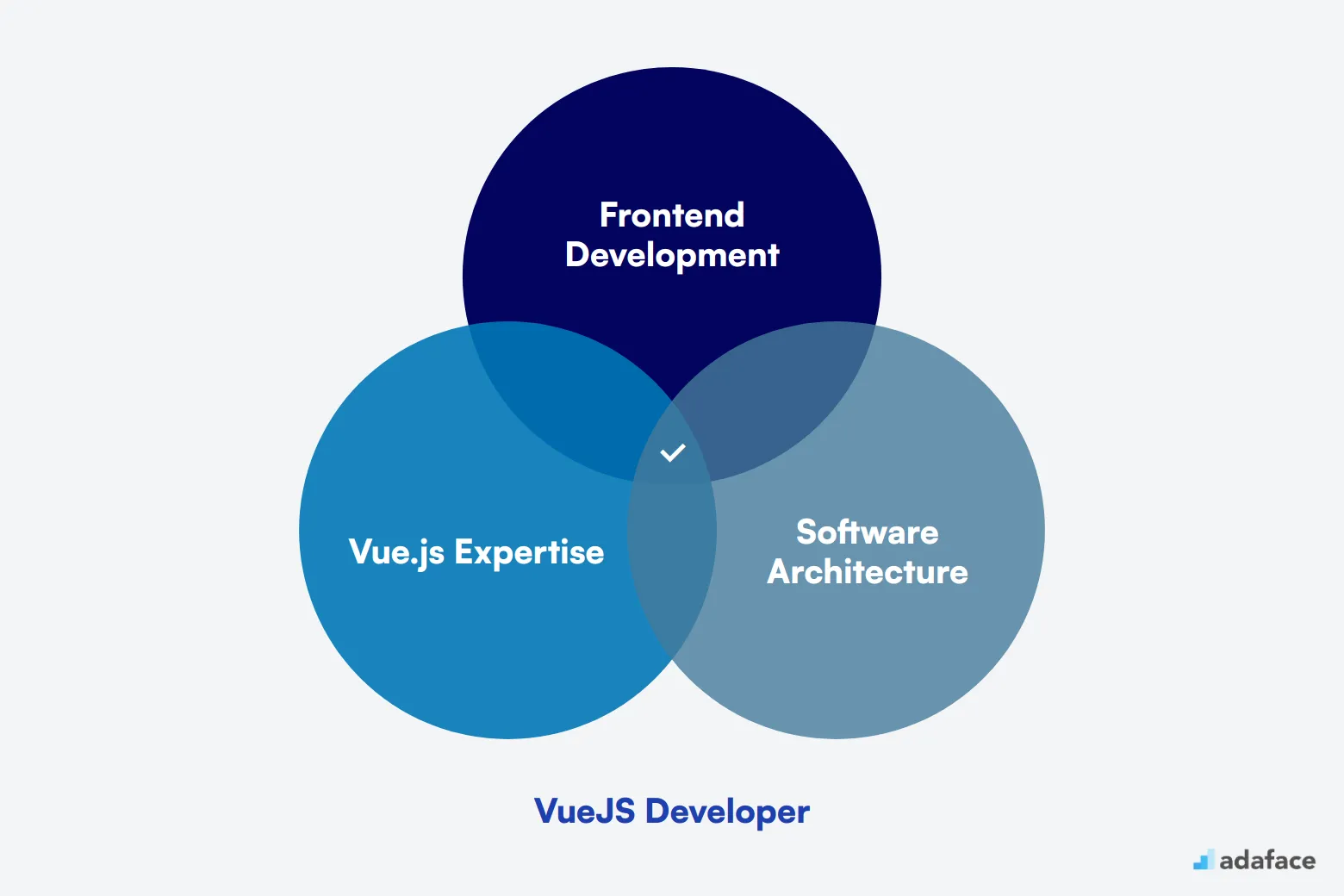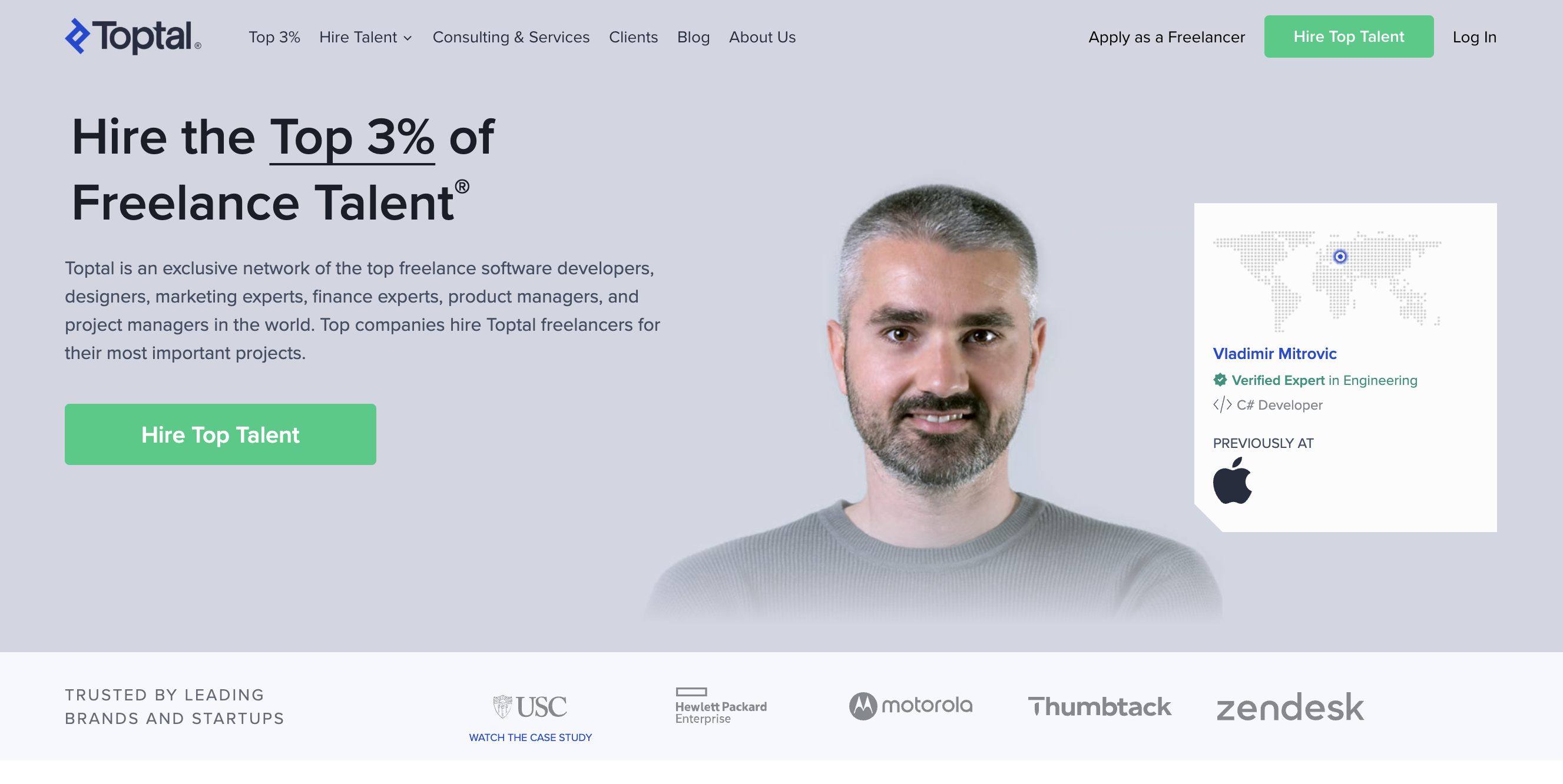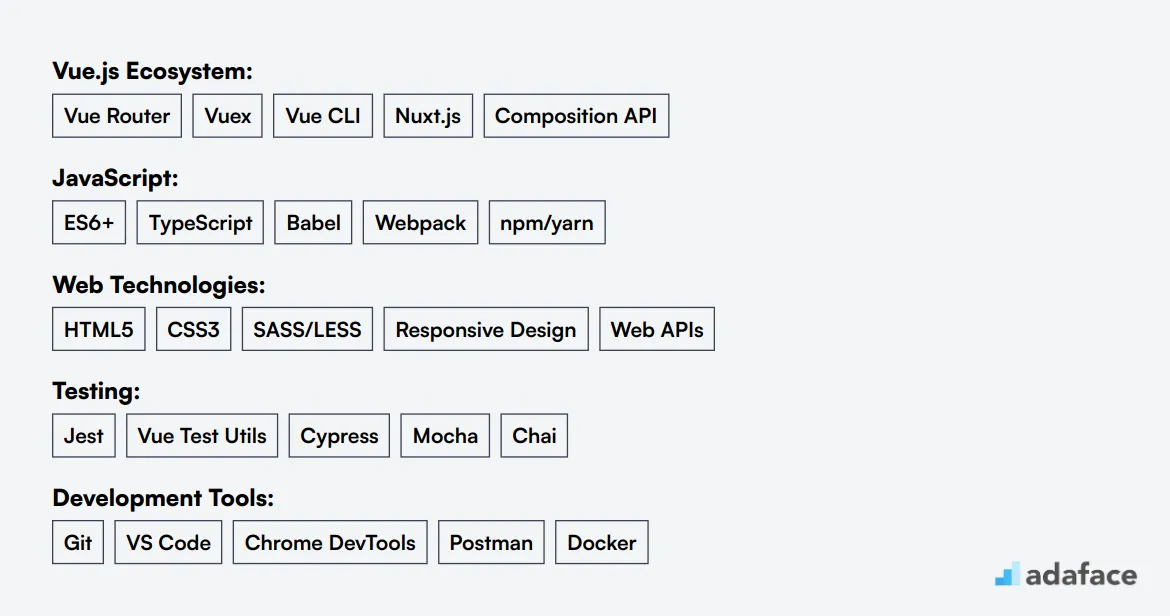Hiring a VueJS developer can be a game-changer for your web development projects. These professionals bring specialized skills to create dynamic, responsive user interfaces. However, many recruiters stumble when it comes to identifying the right talent. The key lies in understanding the nuances of VueJS development and aligning candidate skills with your project needs.
This comprehensive guide walks you through the entire process of hiring a VueJS developer. From crafting an effective job description to conducting technical assessments, we'll cover everything you need to know. To get started, check out our VueJS assessment test to evaluate potential candidates.
Table of contents
Why Hire a VueJS Developer?
To determine if you need a VueJS developer, start by identifying specific frontend challenges your company faces. For instance, you might need to build a responsive, high-performance user interface for a complex web application.
Consider these potential use cases for a VueJS developer:
- Revamping an outdated website with a modern, component-based architecture
- Creating interactive data visualizations for a dashboard
- Developing a progressive web app for improved mobile user experience
If these align with your project needs, it may be time to hire a full-time VueJS developer. For smaller projects or to test the waters, consider working with a freelance developer or agency first.

What Does a VueJS Developer Do?
A VueJS Developer specializes in building user interfaces and single-page applications using the Vue.js framework. They create visually appealing and responsive web applications that enhance user experiences, ensuring smooth navigation and interactivity.
The day-to-day responsibilities of a VueJS Developer include:
- Writing clean and maintainable code using Vue.js to develop web applications.
- Collaborating with designers and backend developers to implement UI/UX designs.
- Optimizing applications for speed and scalability.
- Debugging and troubleshooting to improve the functionality of applications.
- Staying updated with the latest industry trends and integrating VueJS best practices in development projects.
For more on what skills are required, you can explore skills required for VueJS developer.
Building the Ideal Candidate Profile for a VueJS Developer
When hiring a VueJS Developer, it's important to clearly distinguish between required and preferred skills. Many hiring managers overlook this distinction, which can lead to either missing out on great talent or setting unrealistic expectations. For example, while Vue.js expertise is necessary, familiarity with other frameworks like React or Angular might simply be a bonus.
Here are some key skills and qualifications to consider when crafting your ideal VueJS Developer profile:
- Required Skills and Qualifications:
- Proficient in Vue.js and its core principles
- Experience with JavaScript ES6+ and TypeScript
- Familiarity with RESTful APIs and modern frontend build tools
- Understanding of state management patterns and libraries (e.g., Vuex)
- Knowledge of responsive web design and cross-browser compatibility
- Preferred Skills and Qualifications:
- Experience with server-side rendering and Nuxt.js
- Familiarity with testing frameworks like Jest or Mocha
- Knowledge of CI/CD pipelines and version control with Git
- Understanding of web accessibility standards
- Experience with other frontend frameworks (React, Angular)
It's beneficial to explore technical screening methods to ensure candidates meet these expectations, helping you find the right fit for your team.
| Required skills and qualifications | Preferred skills and qualifications |
|---|---|
| Proficient in Vue.js and its core principles | Experience with server-side rendering and Nuxt.js |
| Experience with JavaScript ES6+ and TypeScript | Familiarity with testing frameworks like Jest or Mocha |
| Familiarity with RESTful APIs and modern frontend build tools | Knowledge of CI/CD pipelines and version control with Git |
| Understanding of state management patterns and libraries (e.g., Vuex) | Understanding of web accessibility standards |
| Knowledge of responsive web design and cross-browser compatibility | Experience with other frontend frameworks (React, Angular) |
How to write a VueJS Developer job description?
Once you have a candidate profile ready, the next step is to capture that information in the job description to attract the right candidates. A well-crafted job description can make all the difference in finding a skilled VueJS developer.
- Highlight key responsibilities and impact: Clearly outline the key responsibilities of the role, including specific tasks like building user interfaces and collaborating with back-end developers. Demonstrating how this role affects your product and user experience will attract candidates who are keen to make an impact.
- Balance technical skills with soft skills: While it's important to list required skills like Vue.js, JavaScript, and HTML/CSS, don't forget to emphasize soft skills such as teamwork and effective communication. This balance ensures you attract candidates who can collaborate well within your team.
- Showcase your company's unique attributes: Mention what makes your company special—be it innovative projects, a supportive culture, or opportunities for growth. Sharing these unique selling points can appeal to candidates looking for a place that aligns with their values and career goals.
For more guidance on structuring your job description, refer to the VueJS developer job description template.
10 platforms to hire VueJS Developers
Once you've created a solid job description for your VueJS developer position, the next step is to list the role on various job platforms to attract qualified candidates. Utilizing multiple channels can increase your chances of finding the right fit for your team.
LinkedIn Jobs
Ideal for posting full-time VueJS developer positions. Large professional network allows for targeted job listings and easy candidate screening.

Indeed
Widely used job board for full-time VueJS roles. Offers a large candidate pool and resume database for efficient hiring.

Toptal Vue.js Developers
Pre-vetted freelance VueJS developers for high-quality, short-term projects. Ideal for companies needing top-tier talent quickly.

To start, consider platforms like LinkedIn Jobs, where you can connect with professionals and tap into a large network, or Indeed, known for its extensive resume database. Other options include specialized boards like Vue.js Jobs, which focuses specifically on Vue.js roles, and Stack Overflow Jobs, which targets tech-savvy candidates. By leveraging these platforms, you can reach a diverse pool of applicants to help fulfill your hiring needs.
How to Screen VueJS Developer Resumes
Resume screening is your first step to narrowing down candidates for a VueJS developer role. It helps you identify promising applicants and save time during the hiring process. Screening allows you to focus on resumes that align with the skills and qualifications required for the role.

To manually screen resumes, you need to know the keywords that matter. Look for terms like Vue.js, JavaScript ES6+, and TypeScript. Also, check for experience with tools like Vuex and Nuxt.js. This helps in quickly identifying candidates with the right expertise. For more insights on specific VueJS Developer Interview Questions, visit our blog.
Alternatively, you can leverage AI tools to make your resume screening process more efficient. Large Language Models (LLMs) like ChatGPT can help filter resumes based on the keywords you provide. This automation saves time and allows you to focus on high-potential candidates, especially when dealing with a high volume of applications.
Here's a handy prompt to use with AI tools for screening VueJS developer resumes:
TASK: Screen resumes to match job description for VueJS developer role
INPUT: Resumes
OUTPUT: For each resume, provide following information:
- Email id
- Name
- Matching keywords
- Score (out of 10 based on keywords matched)
- Recommendation (detailed recommendation of whether to shortlist this candidate or not)
- Shortlist (Yes, No or Maybe)
RULES:
- If you are unsure about a candidate's fit, put the candidate as Maybe instead of No
- Keep recommendation crisp and to the point.
KEYWORDS DATA:
- Vue.js and its ecosystem (Vuex, Nuxt.js)
- JavaScript (ES6+, TypeScript)
- Web Technologies (HTML5, CSS3, Responsive Design)
Recommended Skills Tests to Screen VueJS Developers
Skills tests are a great way to ensure your VueJS developer candidates have the right abilities to meet your project requirements. By focusing on relevant technical skills, you can find developers who are not only skilled but also fit well with your team.
VueJS Assessment Test: This test is specifically designed to evaluate the candidates' knowledge and expertise in VueJS. It helps identify their understanding of VueJS frameworks, components, and best practices in building interactive web applications. VueJS Assessment Test
JavaScript HTML Vue Test: This test assesses the candidate's ability to integrate VueJS with core web technologies like JavaScript and HTML. It ensures the candidate can handle client-side scripting and can effectively develop user interfaces. JavaScript HTML Vue Test
Front-end Developer Test: For a broader evaluation, this test examines the candidate's skills in front-end development, covering essential aspects such as responsive design, cross-browser compatibility, and web performance. Front-end Developer Test
Nuxt.js Test: If your project involves server-side rendering or static site generation, the Nuxt.js test is valuable. It assesses the candidate's understanding and capability to work with this powerful VueJS framework. Nuxt.js Test
Full Stack Developer Test: This test is suitable for evaluating candidates who need to work across both front-end and back-end technologies, ensuring they have well-rounded capabilities to manage the complete development process. Full Stack Developer Test
Case Study Assignments to Evaluate VueJS Developers
Case study assignments can be effective for assessing VueJS developers' skills, but they come with drawbacks. They're often lengthy, resulting in lower completion rates and potentially losing good candidates. Despite these challenges, well-designed case studies can provide valuable insights into a candidate's problem-solving abilities and VueJS expertise.
Build a Simple Task Management App: This case study asks candidates to create a basic task management application using VueJS. It tests their ability to handle state management, component creation, and basic CRUD operations. This assignment is particularly useful for evaluating a developer's skills required for a VueJS developer.
Implement a Real-Time Chat Feature: In this assignment, developers are tasked with adding a real-time chat feature to an existing VueJS application. This tests their understanding of Vue's reactivity system, WebSocket integration, and state management in more complex scenarios.
Create a Responsive Dashboard: This case study involves building a responsive dashboard with various data visualizations using VueJS and a charting library. It assesses the candidate's ability to integrate third-party libraries, handle responsive design, and manage complex data flows within a Vue application.
What's the difference between a Frontend VueJS Developer and a Full-stack VueJS Developer?
Many recruiters often confuse Frontend VueJS Developers with Full-stack VueJS Developers due to their overlapping skills. However, these roles have distinct differences in terms of scope, responsibilities, and required expertise.
Frontend VueJS Developers focus primarily on client-side development using JavaScript, HTML, and CSS. They specialize in creating UI components and enhancing user experience with Vue.js and Vue Router. Their toolkit typically includes Webpack, Babel, and ESLint for efficient development workflows.
Full-stack VueJS Developers, on the other hand, handle both client-side and server-side development. In addition to frontend skills, they work with Node.js and Express for backend development. They're responsible for API integration and have knowledge of SQL/NoSQL databases.
Experience levels also differ, with Frontend VueJS Developers typically having 0-2 years of experience, while Full-stack VueJS Developers usually have 2-5 years under their belt. This broader skillset allows Full-stack developers to manage full application deployment, including server configuration and database management.
| Frontend VueJS Developer | Full-stack VueJS Developer | |
|---|---|---|
| Focus | Client-side development | Client-side and server-side |
| Languages | JavaScript, HTML, CSS | JavaScript, HTML, CSS, Node.js |
| Frameworks | Vue.js, Vue Router | Vue.js, Vue Router, Express |
| Responsibilities | UI components, UX design | UI components, API integration |
| Tools | Webpack, Babel, ESLint | Webpack, Babel, ESLint, Docker |
| Database Knowledge | Limited or none | SQL/NoSQL databases |
| Deployment | Static site hosting | Full application deployment |
| Experience Level | 0-2 years | 2-5 years |
What are the ranks of VueJS Developers?
When hiring VueJS developers, it can be challenging to distinguish between various roles due to overlapping skills and responsibilities. However, understanding the ranks can help you identify the right fit for your project's needs.
- Junior VueJS Developer: This is an entry-level position suitable for candidates who are just starting their careers in web development. They typically assist in coding simple features, fixing minor bugs, and learning from more experienced developers.
- Mid-Level VueJS Developer: Developers at this level have gained some experience and can handle more complex tasks. They often work on implementing features, optimizing performance, and collaborating with other team members to build robust applications.
- Senior VueJS Developer: Senior developers have a deep understanding of VueJS and extensive experience in crafting and maintaining applications. They are responsible for leading projects, mentoring junior team members, and making key architectural decisions.
- Lead VueJS Developer: At the top of the hierarchy, lead developers oversee the entire development lifecycle of a project. They manage teams, coordinate with stakeholders, and ensure that best practices are followed throughout the development process. For more details on the VueJS Developer Job Description, you can explore related resources.
Hire the Best VueJS Developers
In this guide, we discussed the importance of hiring VueJS developers, their role, and how to create a strong job description to attract the right talent. We also covered various platforms for hiring, ways to screen resumes, and recommended skill tests to assess the capabilities of potential candidates.
If there's one key takeaway, it's that using clear job descriptions and appropriate skills tests can greatly improve your hiring accuracy. Consider employing tests like the VueJS assessment test to ensure candidates possess the necessary skills. This approach will help you efficiently identify the best developers for your team.
Vue.js Online Test
FAQs
Look for strong JavaScript fundamentals, experience with Vue.js framework, knowledge of state management (e.g., Vuex), familiarity with Vue CLI, and understanding of component-based architecture. Additionally, skills in HTML, CSS, and responsive design are important.
Use a combination of coding tests, technical interviews, and practical assignments. Our VueJS assessment test can help evaluate candidates' proficiency in Vue.js concepts and best practices.
Look for VueJS developers on tech job boards, GitHub, Stack Overflow, LinkedIn, and Vue.js community forums. Attending Vue.js meetups and conferences can also be effective for networking with potential candidates.
Include required technical skills, experience level, project responsibilities, and any specific Vue.js related tools or libraries your company uses. Be clear about the role's expectations and how it fits into your development team structure.
Senior developers typically have 3+ years of Vue.js experience, a deep understanding of Vue.js internals, experience with large-scale applications, and strong architectural skills. Juniors may have 0-2 years of experience and require more guidance on complex projects.
Look for strong problem-solving abilities, good communication skills, ability to work in a team, attention to detail, and a willingness to learn and adapt to new technologies and best practices in the Vue.js ecosystem.
Include behavioral questions in your interviews, discuss your company's values and work environment, and consider a trial project or pair programming session to see how the candidate interacts with your team.

40 min skill tests.
No trick questions.
Accurate shortlisting.
We make it easy for you to find the best candidates in your pipeline with a 40 min skills test.
Try for freeRelated posts
Free resources



